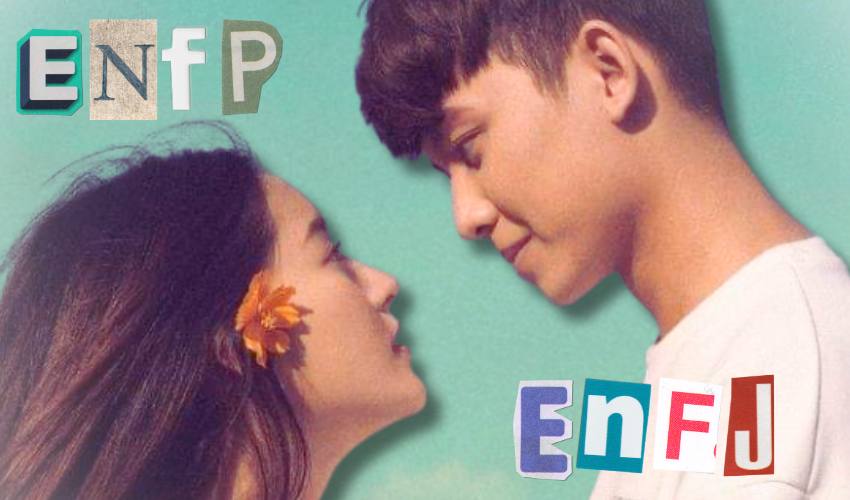Summer in the countryside by iNeedChemicalX
In the Myers-Briggs type theory, the dominant function is believed to be the first function to develop in the function stack of each personality type. This supposedly occurs around the age of 6 as part of the process known as differentiation where the cognitive preferences begin taking shape. Here is a look at what each MBTI personality is like during childhood growing up.
INFJ
As a child, INFJs are likely to be unassuming and quiet yet able to acquire many friendships and interact with various types of people. INFJs are bound to be relatively well behaved and mature for their age and their parents may entrust them with responsibilities early on. As introverts, they probably spend much of their time reading or writing in a journal. They may have casual creative outlets such as writing short stories and poems, sketching and design work. Even though they maintain a very private world, they also make time for family and friends to bond and spend quality time with them. They cherish their friendships and are likely to have a special besty with whom they can really be their true selves. INFJs tend to project an image that changes according to who they’re engaging with. They may appear like chameleons due to their ability to mirror people.
INFP
INFPs as children may be very shy and reserved with strangers. They spend much of their time in their own world because their sensitive nature’s are easily overwhelmed by the energy of those around them both good and bad. They have trouble with criticism and tend to get defensive and sulk when they feel rejected or unloved. They have a tendency to internalize their pain and channel it into some creative outlet where they can escape to their imagination. They have trouble asserting themselves sometimes and they often have difficulty seeing things from other people’s perspective. They need lots of love and affection but they also want to reciprocate and they love to dote on animals and small babies. INFP children tend to move at their own pace and have little concept of time and schedules. They can be very messy and procrastinate about picking up after themselves.
INTJ
Growing up, INTJs might be described as being bright, quiet and independent. They are highly observant and curious and may spend a vast amount of time on their own reading or engaging in their hobbies. They often get lost in thought and become inattentive and unaware of their surroundings and of people speaking to them. INTJ children are very reserved around people and get intimidated by group situations. In school, they can be excellent students but they dislike receiving too much direction or doing redundant work. They like being given an objective and just enough information to get started and they’ll go figure out the rest. Certain topics may be of special interest to them and INTJ kids are compelled to read and learn all they can about those things above and beyond what is required for class. INTJ children tend not to share what they feel but are very candid when asked.
INTP
During childhood, INTPs are bound to be very inquisitive but struggle with shyness and may experience sometimes severe anxiety when entering new situations and meeting new people. Usually, friendships are initiated by others and INTPs may spend a lot of time fantasizing about the romantic crush they will never ask out. Their temperament is generally reserved when in groups but in one-on-one settings their unorthodox wit flows more freely. During their formative years, INTPs may be very cagey, selfish, hypersensitive to rejection and territorial about what they consider theirs. They may have immature outbursts and likely get into trouble for back-talk and questioning what adults tell them. They take issue with being coerced to do anything for which they don’t understand the reason. Many adults are bound to take the INTP’s questions as an affront to their authority and may feel they owe no explanation to the INTP child. “Because I said so” is one of the last things INTPs want to hear as an answer.
ENTJ
As children, ENTJs exhibit strong reasoning skills and critical thinking ability. They think logically and are not receptive of things they deem insensible. They plan things out and they show initiative in recognizing things that need to be done. Their minds are often thinking ahead anticipating and planning for things not on other people’s radar. Their parents may not always understand the significance of what ENTJs spend their time on but odds are that it is something ambitious. ENTJ children are goal oriented. In school they are often active participants who may blurt out answers without thinking them through much. They are very intuitive and can seem like mind readers the way their fast minds work. Although they are not very detail-oriented, they can be very thorough when mastering a topic for which they are deeply interested in.
ENTP
ENTP children are probably very talkative and hyperactive. They are never at a loss for words and they are often very amusing. They need explicitly defined rules and boundaries otherwise they will push and bend them at will. ENTPs can be argumentative and clash with their parents over many issues and may often appear like arrogant know-it-alls. In their early years, ENTPs are likely to be very inquisitive and ask countless questions at the risk of annoying their parents. They have hyperactive imaginations and they love to spitball ideas and talk about endless “what if” questions with their friends. They are humorous and likely crack up people up with their unorthodox stream of consciousness. In school, they are probably known for being outspoken with a tendency for saying brazen or inappropriate things.
ENFJ
ENFJ children desire lots of love and positive reinforcement from their parents. They need encouragement and constant reminders from the people whose opinions they value most. They can be deeply affected by criticism and they strive to be above reproach so as to avoid receiving it. In their youth, ENFJs may create a lofty ideal or standard in their minds that they desire to live up to. They may hold a very naive outlook and sometimes unrealistic expectations of people. They themselves are very kind and open-minded and so they may have great difficulty understanding the heartlessness and cruelty that exists in the world. ENFJ children are deeply empathetic and they are very receptive and responsive to the feelings of others. They bask in other people’s joy and commiserate with their suffering. They hate being judged and they try to refrain from judging others. They have a special capacity for seeing the humanity in even the worst people.
ENFP
In their youth, ENFPs pick up very easily on other’s vibe and attitude and they use this to side step conflicts or befriend people. This allows them to also manipulate parents and coax them into seeing things their way or get them to do what ENFP wants without realizing it. They have trouble accepting being told they can’t do something or the idea that they can’t have what they want. Even as a child, ENFPs push boundaries believing anything is possible if they try hard enough. They derive self esteem from their abilities and will strive to do things for themselves. ENFPs want freedom to explore what really interests them and trying to restrict this will only stunt and disillusion them. They crave positive feedback for their ideas and with the emotional support of family and friends, can go on to realize many of their wild aspirations.
ESTJ
ESTJ children appreciate order and structure. They respect and look up to people they perceive as authority figures and desire to learn from them. Even in their youth, ESTJs are goal oriented. They plan and think things through, but they do so relatively quickly and decisively. They make up their minds fast because they rely mostly on facts and rarely change their minds afterwards. They are honest and fair and typically have a keen sense of justice even at a young age. They may even feel obliged to help enforce the rules. ESTJs are very studious and seek to acquire solid understanding of the facts surrounding an issue or topic of relevance. They want answers and they can devote a substantial amount of their time to find them. ESTJs children are direct and assertive in how they communicate and may sometimes say insensitive and inappropriate things and engage in physical aggression. Their tempers can flare up but the situation can be deescalated by speaking to them calmly and logically explaining the problem with their behavior.
ESFJ
ESFJ children are generally friendly and happy in temperament. They enjoy school because it satisfies their need for social interaction and engagement. They are likely to be active in class in also in extracurricular activities and after school clubs. They are usually very responsible and often the first to volunteer wherever needed. ESFJ kids love to talk and their mouths may sometimes get them in trouble but they otherwise keep themselves out of hot water. They hate being alone and prefer to work in groups or with others around to keep them company. They work best as part of a team and are more productive that way. They have a strong need to be liked and they may ingratiate themselves with their teachers and earn the status of teacher’s pet. ESFJ kids try to make others happy and seek positive feedback and affirmation from others in return. Criticism can be a difficult pill for them to swallow and so care should be taken so as not to crush their spirits when critiquing their performance.
ISTJ
ISTJ children are learn best from experience and they exhibit very practical sensibilities. They plan and follow through and they will take their time and be very meticulous about their work. They need specific instructions on what to do and don’t fare well when left to do their own thing or be creative. In school they are very diligent students who complete their assignments on time and they typically have great respect for their teachers and people who occupy positions of authority. ISTJs kids have excellent memories and they have a great capacity for rote learning and absorbing facts. They are most happy when they have a consistent and stable routine that allows them to stay busy and productive. The ISTJ child may have a narrow field of interests and prefer to develop extensive proficiency in a particular area rather than spread their focus across a variety of topics. They like to show off their knowledge and spout off statistics and data like a savant. They are also good with schedules and can be relied upon to fulfill their obligations and carry their responsibilities like a mature adult.
ISFJ
ISFJ children are observant and ever busy gathering facts and storing them away for future reference. They are shy and modest in temperament and often do not call attention to what they do although they do desire praise and recognition for their efforts. They are very generous and kind to others and share freely with them. ISFJ kids remember what they are told and are very good with following step by step instructions. They like having a clear set of directions to follow and a defined role to play or list of tasks to complete which they will perform dutifully. ISFJ children are very obedient but they may get into arguments with siblings. They are highly sensitive to criticism especially when they’ve tried very hard to do their best. They may exhibit a lot of perfectionist behavior and can be quite hard on themselves. They are reluctant to change their routines or try new things. Their parent may have to encourage them to venture outside their comfort zones and be more exploratory and broaden their horizons.
ESFP
During their youth, ESFPs are very lively and dramatic. They are very energetic going from one thing to the next in an ongoing series of distractions. They are likely to be loud and fun and super friendly. They may be naively open-minded and willing to talk to anybody willing to listen to them. They like hands on activities and they learn best through experience and trying out out for themselves rather than just reading about it. ESFP children are likely to be very honest and forthright but well meaning. They have a short attention span but they are good at getting things done quickly and skillfully. When it comes to discipline, ESFP children learn best by example. They are great mimics, and are very likely to pick up on the behaviors of their parents and other important adults in their lives.
ESTP
As a youth, ESTPs are likely to be unruly and rambunctious. They’re full of energy and their parents may have their work cut out for them when trying to rein them in. ESTP children are bound to be athletic and attracted to the world of sports. In school, they may struggle because of boredom and their lack of interest in abstract subject matter. ESTPs may have discipline issues and a tendency to be disruptive and act impulsively without thinking about the consequences. They push the limits and bend rules but at the same time, may also be very humorous and popular for their attention grabbing antics. Their persuasive abilities have probably allowed them to weasel themselves out of many a predicament and avoid or mitigate punishment.
ISFP
ISFP kids are likely to be very shy and sensitive. They very dreamy and imaginative and may have trouble focusing in school or on tasks that are time consuming. Their feelings are easily hurt and may not take criticism well. If the ISFP feels unconditional love and acceptance, they are more likely to feel self-confident, and will be able to handle some criticism. At a young age, their use of logic may be very underdeveloped and they may have a tough time seeing things outside of their own perspective. The ISFP child is bound to be very easygoing and kind but can at times become moody and depressed without warning. They procrastinate and may be unreliable about completing tasks assigned to them in a timely manner. They are often fearful of making decisions because they think that they are final and unalterable, and they’re afraid of making the wrong choice.
ISTP
In their youth, ISTPs are very quiet and shy. They may be very curious about their environment and interesting objects and devices. They probably take an interest in tactile activities like card games, model building and sports. They are likely to become very handy around the house due to their ability to fix and figure how things work. They may show less interest in abstract concepts and theories that produce nothing tangible for them. They may be aficionados of certain things and likely collect things like art and memorabilia that signify their special interests. ISTPs children do not care as much for gratuitous and glib praise but desire specific, sincere and meaningful feedback about what they do and what is good about it. ISTP children follow the rules but do not like being told explicitly what to do. They will do best with assignments in which they are told what the desired goal is and any rules that must be followed, and left to their own devices to achieve the goal. They work best alone and may have problems with groups assignments, and may reject these kinds of projects by not participating much.
[ads_btn label_btn=”Subscribe to Blog” url=”https://astroligion.com/subscribe-and-stay-posted/” target=”true” view_btn=”adsbtn-double” icon=””]
related posts:
- What Every Myers-Briggs Type Wants Most From Others
- What Each Myers-Briggs Type Is Smug About
- What Each Myers-Briggs Type Does When No One’s Looking
- What Each Myers-Briggs Type Was Made To Do
- What Each MBTI Personality Hates
- How Each Myers-Briggs Type Uses Religion
- 6 Signs An INTP Likes You | How INTPs show love
- The 8 Rules of INTJ Club | How To Be INTJ
- How INFJs Show Love; 7 Signs An INFJ Likes You
- https://www.psychologyjunkie.com/2015/09/17/the-childhood-struggles-of-every-myers-briggs-type/
- https://thoughtcatalog.com/heidi-priebe/2015/08/what-each-myers-briggs-personality-type-was-like-as-a-child/
- http://www.typologycentral.com/forums/myers-briggs-and-jungian-cognitive-functions/74407-childhood-type-descriptions.html
- http://personalitycafe.com/myers-briggs-forum/513266-mbti-childhood-abuse.html
- ISFJ and ISTJ in love: 5 Essential Dynamics of their Relationship - February 24, 2024
- ENTP and ENTJ in love: 6 Critical Dynamics of Their Relationship. - February 18, 2024
- ESTJ and ESFJ in love: 4 Key Aspects of their Relationship. - February 12, 2024





